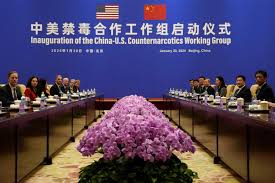Fentanyl Epidemic and Rising US-China Trade Strains
Current Affairs International IssuesPosted by newadmin on 2025-01-30 08:44:58 |
Share: Facebook | Twitter | Whatsapp | Linkedin Visits: 34

Recently, US President Donald Trump announced plans to impose a 10% punitive duty on Chinese imports. This decision is driven by concerns over the growing influx of fentanyl into the United States, with China being a major source of the drug. The opioid epidemic has reached alarming levels in the US, prompting urgent discussions on both trade policies and public health measures.
Fentanyl is a powerful synthetic opioid used medically as an analgesic and anesthetic. It is significantly more potent than morphine and heroin, making it effective for pain relief but also highly dangerous. Overdoses can lead to respiratory failure and death, and its addictive nature has made it a major contributor to the opioid crisis in the US.
The country has been battling a worsening opioid epidemic for decades. In 2021 alone, more than 107,000 drug overdose deaths were reported, with approximately 75% involving opioids. The crisis has been escalating since 1999, with synthetic opioids like fentanyl playing a key role. Many individuals who become addicted initially start with prescription painkillers before turning to more potent and illicit alternatives.
China has been identified as a significant player in the fentanyl crisis, with reports indicating that fentanyl and its precursor chemicals are often trafficked from China to the US via Mexico. Investigations have revealed the involvement of Chinese companies in manufacturing the chemical components necessary for synthetic opioid production. Additionally, the Chinese Communist Party has faced allegations of subsidizing these operations, further complicating efforts to curb the crisis.
Diplomatic relations between the US and China have deteriorated in recent years, making it difficult to establish effective cooperation in combating fentanyl trafficking. While collaboration is essential in addressing the issue, enforcement actions in China are often hindered by local governance priorities, which sometimes favor economic benefits over strict regulation.
The opioid crisis in the US is not solely a result of international drug trafficking. Domestic factors, such as the over-prescription of opioids by pharmaceutical companies, have played a significant role in the widespread addiction problem. Many individuals who misuse opioids begin with legally prescribed medications before becoming dependent and turning to illicit sources.
Addressing the fentanyl crisis remains a complex challenge that requires a multifaceted approach. While international cooperation is crucial in disrupting supply chains, the US must also focus on tackling its domestic issues, including improving addiction treatment and implementing preventive measures. The crisis continues to demand urgent and coordinated action on multiple fronts to curb its devastating impact on public health and society.
Search
Categories
Recent News
- Iranian Women Break Free: Motorcycles and More
- Neves' Long-Term Commitment: Al-Hilal Secures Their Star
- Unveiling the Secrets of Seduction: China's Controversial Flirtation School
- Chanu's Triumph: Smashing Records, Lifting Spirits
- Williams Unveils New Challenger: FW48 Takes Center Stage
- Telangana's Security Alert: Revanth Reddy's Swift Action Post-Operation Sindoor
- Telangana High Court Orders Police Decision on Higher Ed Protest
- Hyderabad's Snake Charmer: Drunk Driver's Bizarre Escape Attempt
Popular News
- Navigating IPO Market Dynamics Amid Volatility and Regulatory Changes
- Massive Worldwide Microsoft Outage Disrupts Multiple Sectors
- Panjapur Bus Stand to Reshape TNSTC Routes
- తెలుగుదేశం పార్టీ - పేదరికాన్ని నిర్మూలించడంలో వాగ్దానం
- Universities Embrace Remote Learning Technologies Amidst Ongoing Pandemic